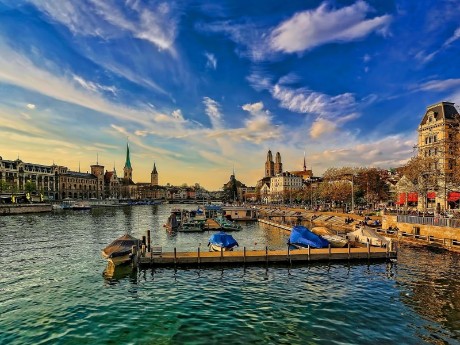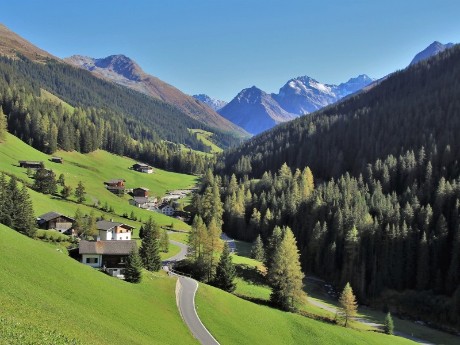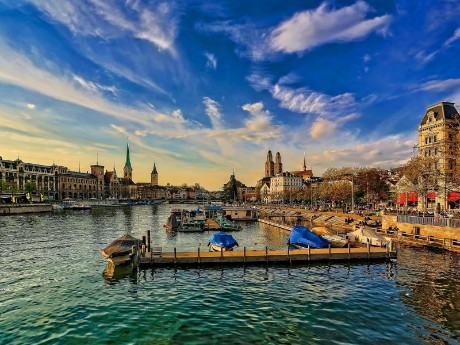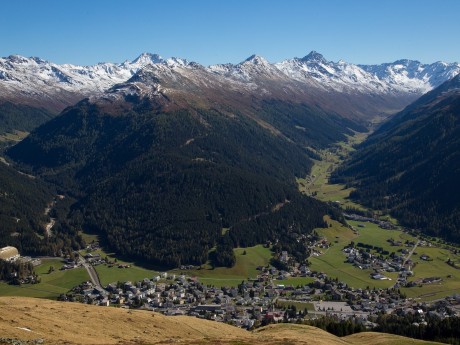Winter Wonderland Switzerland: Zurich and Davos
Discover ancient architecture, climb the Swiss Alps or ski on breathtaking mountains on this winter adventure of Switzerland. Start your journey in Zurich, the largest city in Switzerland. Art enthusiasts will enjoy the outstanding museums such as Kunsthaus Zurich while shopaholics will find paradise at Bahnhofstrasse. For those more in touch with nature, take a boat cruise tour or visit Switzerland's many lakes and waterfalls, such as Rhine Falls.
Read more
Discover ancient architecture, climb the Swiss Alps or ski on breathtaking mountains on this winter adventure of Switzerland. Start your journey in Zurich, the largest city in Switzerland. Art enthusiasts will enjoy the outstanding museums such as Kunsthaus Zurich while shopaholics will find paradise at Bahnhofstrasse. For those more in touch with nature, take a boat cruise tour or visit Switzerland's many lakes and waterfalls, such as Rhine Falls. We recommend renting a car to see it all at your own pace. After indulging in decadent chocolate and wandering around the city, make your way to the next destination, Davos. Located in the canton of Graubünden, this famous ski resort is the ideal destination for downhill and cross-country skiers. Take a scenic train ride with the Glacier Express or go on a 2-hour tandem paragliding adventure. Don’t miss out on visiting the Kircher Museum! Ride the Schatzalp cog railway up and down the slope, and ski across Jakobshorn mountain. Visit during the colder months to fully experience a winter wonderland adventure in this hidden town in the Swiss Alps! Waterviews strives to offer accommodation options within walking distance of water and/or in an area of touristic interest. Our prices include taxes (but excludes local tourist taxes). Customize your trip to your personal preferences with optional activities (hit the “Add Activities’’) or change hotels, etc. Contact us for customization at no extra cost at: Service@waterviewstravel.com
Destinations
- Zurich
- Davos
- Zurich
Itinerary
Zurich

Although known worldwide as a centre for banking and finance, Switzerland’s largest city has a lot more to offer; its picturesque setting between a lake and a river with the glorious peaks of the Alps in the distance is instantly mesmerising, and the winding cobbled lanes of the old town are filled with intact medieval churches, squares and quaint cafes. Yet despite its rich history, Zürich has a contemporary, vibrant and post-industrial feel and has become a European hub for art, culture and innovation.
Read more
Although known worldwide as a centre for banking and finance, Switzerland’s largest city has a lot more to offer; its picturesque setting between a lake and a river with the glorious peaks of the Alps in the distance is instantly mesmerising, and the winding cobbled lanes of the old town are filled with intact medieval churches, squares and quaint cafes. Yet despite its rich history, Zürich has a contemporary, vibrant and post-industrial feel and has become a European hub for art, culture and innovation.
Additional Information
Zurich is Switzerland's biggest city and a cultural center of German-speaking Switzerland. Despite it not being the administrative capital of any more than its Kanton, Zurich punches well above its weight in terms of major media and business headquarters and due to it being at the heart of Switzerland's excessively punctual and meticulously maintained train network and being home to Switzerland's most important airport, it is often the first part of Switzerland that visitors get to see. Zurich is close to some excellent skiing resorts and many people headed for the Swiss Alps don't spend much time in Zurich itself, but you'd be missing a lot if you don't stay in Zurich for a couple of days at least.
While Zurich can be expensive, it is also clean, efficient and blessed with a high standard of living, which together with the high wages, explains why people bear with the high prices. Zurich has drawn people from the rest of Switzerland for centuries, but in the 20th and 21st century it has also begun to draw both people and companies from outside Switzerland and in some cases even outside Europe. This means that you will hear a lot more languages than just Swiss German and the overall atmosphere is a lot more cosmopolitan than you might think.
Zurich is home to ETH Zurich, one of the world's leading technical universities, which has produced a number of Nobel laureates and numerous innovations and due to Switzerland's long history of neutrality it also houses headquarters of the likes of FIFA or the International Ice Hockey Federation. Zurich is also home to a number of large banking and insurance conglomerates that grew on the fabled Swiss banking secret and still enjoy good reputations in the financial sector.
History
The city's Latin name, Turicum, was used for a Roman customs station at the Limmat, which has some remnants today. The Alemanni, a Germanic tribe, settled in the 5th century.
While the Church used to rule early Medieval Zurich, the Guilds (Zünfte) took power in 1336, establishing Zurich as an autonomous republic. The Guilds have survived until today, though their role today is mostly ceremonial. Zurich became the fifth canton of the Swiss Confederacy in 1351, and has been its capital at times. However, Switzerland's famous neutrality and stability is a modern thing, as many battles have been fought in and around Zurich. The canton lost the Old Zürich War between 1440 and 1446 against the confederacy, and was re-admitted in 1450.
Ulrich Zwingli led the Protestant Reformation in Switzerland during the early 16th century. As the Thirty Years War ended in 1648, the Holy Roman Empire lost its grip on Switzerland, which has mostly been independent since then.
The 1830s and 40s saw a series of revolts and war, including the Züriputsch, a revolt of conservative landowners of the canton, against the city of Zurich, and the 1847 Sonderbund War. In 1848 Switzerland adopted a constitution, which established the country as a federal republic. While the government settled in Bern, many federal institutions, including the new Polytechnic University (ETH) have their seat in Zurich.
The Zurich Stock Exchange was founded in 1877, and the city rose as a financial centre in the 20th century, as Switzerland remained neutral in the World Wars, and could maintain lower taxes on capital than the European great powers. Even though Switzerland has opted out of NATO and the European Union, Zurich is today one of central Europe's most cosmopolitan cities.
Climate
Zurich has a four-season climate typical to central Europe. Temperature in winter is usually around zero degrees, which means that snow can linger or melt away. Summers are warm with temperature in the 20s and occasionally in the 30s. The nearby mountains are significantly colder than in the valley, with snow remaining well into spring.
© Sourced from Wikivoyage
Davos

Davos - known for being home to some of the best skiing in the Swiss Alps as well as the annual World Economic Forum, its streets and slopes are filled year-round with a mixture of holidaymakers and international executives and politicians. Whilst this alpine village is one of the world’s oldest ski resorts, Davos has also become popular for the abundance of hiking trails, health and wellness activities and spas in its surroundings, attracting not only the après-ski enthusiasts but also those looking for a relaxed and peaceful getaway.
Read more
Davos - known for being home to some of the best skiing in the Swiss Alps as well as the annual World Economic Forum, its streets and slopes are filled year-round with a mixture of holidaymakers and international executives and politicians. Whilst this alpine village is one of the world’s oldest ski resorts, Davos has also become popular for the abundance of hiking trails, health and wellness activities and spas in its surroundings, attracting not only the après-ski enthusiasts but also those looking for a relaxed and peaceful getaway.
Zurich

Although known worldwide as a centre for banking and finance, Switzerland’s largest city has a lot more to offer; its picturesque setting between a lake and a river with the glorious peaks of the Alps in the distance is instantly mesmerising, and the winding cobbled lanes of the old town are filled with intact medieval churches, squares and quaint cafes. Yet despite its rich history, Zürich has a contemporary, vibrant and post-industrial feel and has become a European hub for art, culture and innovation.
Read more
Although known worldwide as a centre for banking and finance, Switzerland’s largest city has a lot more to offer; its picturesque setting between a lake and a river with the glorious peaks of the Alps in the distance is instantly mesmerising, and the winding cobbled lanes of the old town are filled with intact medieval churches, squares and quaint cafes. Yet despite its rich history, Zürich has a contemporary, vibrant and post-industrial feel and has become a European hub for art, culture and innovation.
Additional Information
Zurich is Switzerland's biggest city and a cultural center of German-speaking Switzerland. Despite it not being the administrative capital of any more than its Kanton, Zurich punches well above its weight in terms of major media and business headquarters and due to it being at the heart of Switzerland's excessively punctual and meticulously maintained train network and being home to Switzerland's most important airport, it is often the first part of Switzerland that visitors get to see. Zurich is close to some excellent skiing resorts and many people headed for the Swiss Alps don't spend much time in Zurich itself, but you'd be missing a lot if you don't stay in Zurich for a couple of days at least.
While Zurich can be expensive, it is also clean, efficient and blessed with a high standard of living, which together with the high wages, explains why people bear with the high prices. Zurich has drawn people from the rest of Switzerland for centuries, but in the 20th and 21st century it has also begun to draw both people and companies from outside Switzerland and in some cases even outside Europe. This means that you will hear a lot more languages than just Swiss German and the overall atmosphere is a lot more cosmopolitan than you might think.
Zurich is home to ETH Zurich, one of the world's leading technical universities, which has produced a number of Nobel laureates and numerous innovations and due to Switzerland's long history of neutrality it also houses headquarters of the likes of FIFA or the International Ice Hockey Federation. Zurich is also home to a number of large banking and insurance conglomerates that grew on the fabled Swiss banking secret and still enjoy good reputations in the financial sector.
History
The city's Latin name, Turicum, was used for a Roman customs station at the Limmat, which has some remnants today. The Alemanni, a Germanic tribe, settled in the 5th century.
While the Church used to rule early Medieval Zurich, the Guilds (Zünfte) took power in 1336, establishing Zurich as an autonomous republic. The Guilds have survived until today, though their role today is mostly ceremonial. Zurich became the fifth canton of the Swiss Confederacy in 1351, and has been its capital at times. However, Switzerland's famous neutrality and stability is a modern thing, as many battles have been fought in and around Zurich. The canton lost the Old Zürich War between 1440 and 1446 against the confederacy, and was re-admitted in 1450.
Ulrich Zwingli led the Protestant Reformation in Switzerland during the early 16th century. As the Thirty Years War ended in 1648, the Holy Roman Empire lost its grip on Switzerland, which has mostly been independent since then.
The 1830s and 40s saw a series of revolts and war, including the Züriputsch, a revolt of conservative landowners of the canton, against the city of Zurich, and the 1847 Sonderbund War. In 1848 Switzerland adopted a constitution, which established the country as a federal republic. While the government settled in Bern, many federal institutions, including the new Polytechnic University (ETH) have their seat in Zurich.
The Zurich Stock Exchange was founded in 1877, and the city rose as a financial centre in the 20th century, as Switzerland remained neutral in the World Wars, and could maintain lower taxes on capital than the European great powers. Even though Switzerland has opted out of NATO and the European Union, Zurich is today one of central Europe's most cosmopolitan cities.
Climate
Zurich has a four-season climate typical to central Europe. Temperature in winter is usually around zero degrees, which means that snow can linger or melt away. Summers are warm with temperature in the 20s and occasionally in the 30s. The nearby mountains are significantly colder than in the valley, with snow remaining well into spring.
© Sourced from Wikivoyage




